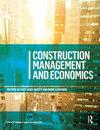根据对项目绩效的影响来确定协作调度实践的优先级
IF 3
Q2 BUSINESS
引用次数: 3
摘要
摘要协同调度(CS)和相关实践影响建筑项目的绩效,可以通过关键绩效指标(KPI)来衡量。然而,对于这些实践中的哪一个得到了实施,以及它们的组合实施可能如何影响KPI,我们知之甚少。本研究的目的是确定对推动项目绩效的CS实践的看法,定义行业使用的影响KPI的CS实践,并建立更普遍实施的、更有可能对KPI产生积极影响的实践。研究小组在美国进行了一项全国性调查,获得了241份可用的回复。利用信息论方法来衡量实施的不确定性和每种实践的影响,该研究建立了一组Chow–Liu树模型,以确定改进CS的最有效行动序列。结果表明,从设计到施工和调试,在项目的整个生命周期内满足业主的期望,使用时间表来支持强大的项目文化,以及有效的沟通计划是提高整体KPI的首要CS杠杆。开发了一种创新的方法来帮助施工项目经理发现每种CS实践的价值、CS实践之间的关系以及CS实践对项目KPI的影响,以便经理可以根据自己的项目需求对其CS实践进行优先级排序,从而有效地提高KPI。本文章由计算机程序翻译,如有差异,请以英文原文为准。
Prioritizing collaborative scheduling practices based on their impact on project performance
Abstract Collaborative scheduling (CS) and related practices impact the performance of construction projects which can be measured by key performance indicators (KPIs). However, little is known about which of these practices are implemented and how their combined implementation might impact KPIs. The objectives of this research are to identify perceptions of CS practices that drive project performance, define CS practices used by industry that impact KPIs, and establish practices that are more commonly implemented and have a higher potential to positively impact KPIs. The research team conducted a nationwide survey in the United States and obtained 241 usable responses. Utilizing an information theory approach to measure the uncertainty of implementation and impact of each practice, the research built a set of Chow–Liu tree models to determine the most efficient sequence of actions to improve CS. Results indicate that meeting owners’ expectation throughout the life-cycle of the project from design through construction and commissioning, using the schedule to support a strong project culture, and an effective communication plan were the top CS levers for overall KPI improvement. An innovative method was developed to help construction project managers discover the value of each CS practice, the relation between CS practices, and CS practices’ influence to project KPIs so that managers can improve KPIs efficiently by prioritizing their CS practices according to their own project needs.
求助全文
通过发布文献求助,成功后即可免费获取论文全文。
去求助
来源期刊

Construction Management and Economics
BUSINESS-
CiteScore
7.50
自引率
14.70%
发文量
58
期刊介绍:
Construction Management and Economics publishes high-quality original research concerning the management and economics of activity in the construction industry. Our concern is the production of the built environment. We seek to extend the concept of construction beyond on-site production to include a wide range of value-adding activities and involving coalitions of multiple actors, including clients and users, that evolve over time. We embrace the entire range of construction services provided by the architecture/engineering/construction sector, including design, procurement and through-life management. We welcome papers that demonstrate how the range of diverse academic and professional disciplines enable robust and novel theoretical, methodological and/or empirical insights into the world of construction. Ultimately, our aim is to inform and advance academic debates in the various disciplines that converge on the construction sector as a topic of research. While we expect papers to have strong theoretical positioning, we also seek contributions that offer critical, reflexive accounts on practice. Construction Management & Economics now publishes the following article types: -Research Papers -Notes - offering a comment on a previously published paper or report a new idea, empirical finding or approach. -Book Reviews -Letters - terse, scholarly comments on any aspect of interest to our readership. Commentaries -Obituaries - welcome in relation to significant figures in our field.
 求助内容:
求助内容: 应助结果提醒方式:
应助结果提醒方式:


